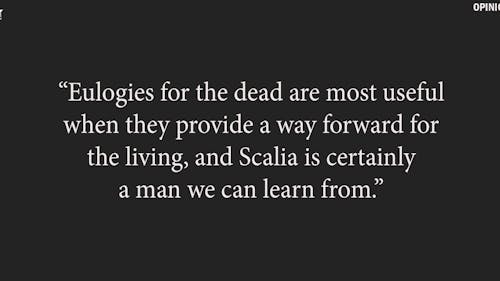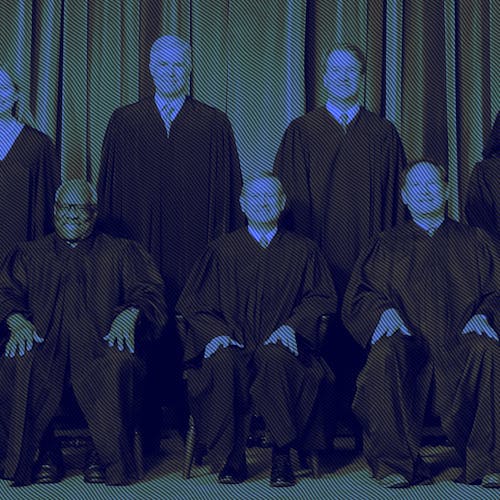BARUH: Scalia deserves recognition for judicial accomplishments

Unless you’ve been hiding under a rock for the past week, you most likely know that Antonin Scalia, an associate justice on the Supreme Court of the United States, has passed away. Serving on the bench for 30 years, Scalia was known for his sharp dissents, conservative outlook and strong belief in adjudicating primarily on the text of the law. Scalia was also regarded (or not, depending on your political views) for his support of “originalism,” a school of thought that says the Constitution should be interpreted as it would have been understood when it was first written. While this newspaper has discussed Scalia’s death in the context of election-year politics, not much has been said about the man himself. Hopefully this article serves a modest eulogy and encourages the reader to learn more about this remarkable man.
Who was Antonin Scalia? That is a question not answered easily. It is tempting to label Scalia as “right-wing,” and while it is true he that was outspokenly conservative, he was not a lone ranger on the Court. Analysis of Scalia’s voting record shows that he was more often than not in the majority, and was generally not the most conservative justice, as Associate Justice of the Supreme Court Clarence Thomas currently holds that unofficial title. Scalia earned the ire of the left with his opinions on same-sex marriage, abortion and affirmative action. But Scalia was close friends with both Associate Justice Ruth Bader Ginsburg and Associate Justice Elena Kagan, both members of the Supreme Court’s left wing. Would two liberal justices be friends with a man who was truly misogynistic, racist and homophobic? Scalia cannot escape being categorized as conservative, but he eludes the labels that many of us might want to slap on him.
Eulogies for the dead are most useful when they provide a way forward for the living, and Scalia is certainly a man we can learn from. Scalia held strongly to his convictions, even when they went against the opinions of his fellow justices and the country. For example, Scalia argued that government should have a role in the nation’s religious dialogue. Many of us would insist that church and state be kept separate, and policymakers check their religion at the door when writing the law. Not to Scalia. In numerous speeches given to audiences that ranged from high school students to Dominican friars, Scalia stressed his belief that the Constitution does not prevent the state from “supporting religion.” Scalia was staunchly Catholic, and his written opinions, especially on homosexuality and abortion, left plenty of room for legislatures to write the law according to their morality, even if their morality was based in faith.
But despite the fact he obstinately clung to his beliefs, he was also a man who cultivated friendships with those who held views opposite his. As mentioned above, Scalia was friends with both Ginsburg and Kagan. While some might view this as a function of the institution, all Supreme Court justices are friends by virtue of "esprit de corps," these friendships seem more than just good working relationships. Scalia and Ginsburg shared a love for opera, and Kagan accompanied him on numerous hunting expeditions. Regardless of Ginsburg’s and Kagan’s ideological differences, Scalia treated them with respect and friendship.
Finally, Scalia was a dissenter. When he was not voting in concurrence with the other justices, Scalia would write sometimes fierce dissents outlining what he believed were the weaknesses in their arguments and the dangers of their liberal jurisprudence. For Scalia, dissent was a tool to correct and refine the misguided arguments of the majority. Sometimes his dissents contained memorable lines or phrases like “argle bargle” (found in Scalia’s 2013 dissent for United States v. Windsor), and Scalia developed a reputation for his unique writing style. Benjamin Cardozo wrote, “the dissenter speaks to the future,” and Scalia spoke to the future by going back to the original meaning of the Constitution. It does not seem likely that we can use the 1780s as a guide to understanding the Constitution in all contexts, but if we should ever lose our way and seek to go back to our roots, Scalia will be right there waiting for us.
Scalia’s body is now in the ground and his seat on the bench is empty. The fight to replace him began only hours after his death, and there is still plenty of time for ugly election-year politics to take a turn for the hideous. We can’t stop the petty fighting that will ensue in the coming months, but we can look to Scalia’s intellectual courage and friendship as inspiration for not only staying true to our beliefs, but also engaging fellow Americans in open and amicable debate.
Yosef Baruh is a School of Arts and Sciences junior majoring in economics with a minor in computer science. His column, "Vox Signata," runs on alternate Mondays.
_____
YOUR VOICE | The Daily Targum welcomes submissions from all readers. Due to space limitations in our print newspaper, letters to the editor must not exceed 500 words. Guest columns and commentaries must be between 700 and 850 words. All authors must include their name, phone number, class year and college affiliation or department to be considered for publication. Please submit via email to oped@dailytargum.com by 4 p.m. to be considered for the following day’s publication. Columns, cartoons and letters do not necessarily reflect the views of the Targum Publishing Company or its staff.



